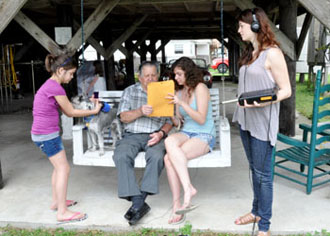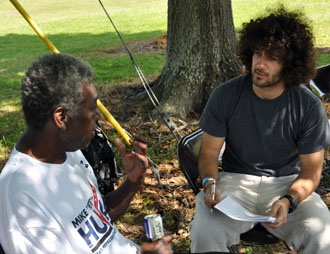Living Language Lab on the Bayou
Hanging out on porches, at picnics and in cafes and bars, students in Nathalie Dajko's field research class have been interviewing speakers of Louisiana French, the language of Cajuns and Creoles.

Near Chauvin, La., students Jordan Krummel, seated, and Liza Patris, standing, interview a native Cajun French speaker. (Photos by Ken Mizuhara)
French has been spoken in Louisiana since the early 18th century, when the French colonized the region. But Louisiana French is in grave danger of disappearing, Dajko says.
According to Dajko, at least three varieties of French evolved in Louisiana as a result of mingling between French colonialists and their slaves who learned French from them, native Louisiana Indians, and Acadians (Cajuns) who came to Louisiana from French-speaking Canada. It can be difficult to draw lines between the varieties.
“Even within a single variety, there is lots of variation and the class made some new discoveries. We found some things that I've never heard before,” says Dajko, a visiting assistant professor who received a PhD in anthropology from Tulane in 2009.

Nick Krummel interviews a Creole French speaker at a Mardi Gras party near Breaux Bridge, La.
Ten students traveled to small towns in Terrebonne, Assumption and St. Martin parishes on four weekends this semester, asking folks to translate sets of English sentences into French. They analyzed features including pronunciation, vocabulary and grammar. Their recordings will be donated to local libraries, as were those from the last time Dajko taught the French field methods class in 2008.
“There aren't many Creole and Cajun speakers anymore,” says Ken Mizuhara, a senior majoring in physics and French. “Documenting the language is important, so it doesn't die out.”
Mizuhara, who lived in France for more than a year when he was in high school, says he didn't realize there was as much difference between Cajun and Creole French as he discovered.
“It's amazing to see how proud people are of their language. I wouldn't have thought it was so important,” Mizuhara says. “It's about the identity of people. They're so proud to be Cajun or Creole.”#x201d;
The class was supported by the Newcomb Fellows Grant Program.
